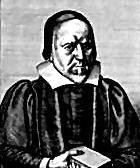Faithful Shepherd 1A
Originally appearing at Heavenly Worldliness, this is a modified version of the first half of Chapter 1 of Bernard's Faithful Shepherd of 1607.
F the necessity and excellence of the ministry and the word preached When the world by wisdom knew not God, it pleased God in his wisdom (1 Co 1:25) to appoint what the world considers a weak means to save his elect - the foolishness of preaching. This is how God usually shows his power to save all who will be saved. From the beginning, preaching and prophesying have been the way.
This is how it was before the fall and after. In Paradise, God taught Adam and Eve both law (Gn 2:16, 17) and gospel, (Gn 3:15). Before the flood, think of Enoch (Jd 14) and Noah (1 Pe 3:19) and after the flood, Moses, Abraham (Gn 20:7, 18:19) Isaac and Jacob and Joseph (Ps 105:22). Jeremiah says (7:25) that from Moses’ time the Lord kept sending his servants the prophets. James says that ordinary teachers of Moses continued down to his own day (Ac 15:21). The Apostle Paul tells us that as Christ sent his apostles and gave them a promise at his ascension (Mt 28:18,19) so he gave gifts for the ministry and preaching that will go on to the end of the world (Ep 4:12, Is 66:11, Je 33:21). Without such gifts people perish (Pr 29:18). How can people call on him in whom they have not believed? How can they believe in one of whom they have not heard? And how can they hear without a preacher? So preaching is very necessary and so are preachers. This is why the Holy Spirit calls ministers of the gospel 'Light, Salt, Saviours, Seers, Chariots of Fire and their Horsemen, Pastors, Planters, Waterers, Builders and Stewards, Watchmen, Soldiers, Nurses, etc'. He compares them to things both common and useful for their purpose, to draw our attention to how much such people are needed by churches and by nations.
Experience teaches us that it is more through the faithful preaching of the Word that people become civil and humane than by passing laws. Laws can hold sin back but only the Word brings about a good conscience to God, true obedience to men and Christian love and piety. Yes, the Word can work the sort of humiliation and subjection (being the power of God) of a voluntary sort, that no human power can. We see this in the example of the King of Nineveh, his nobles and people.
Therefore, even if men have no more grace, they should consider it necessary to promote preaching. Princes should uphold and maintain it. Why then should men not covet to be in this calling even for the public good. It is not only profitable and necessary but also a very honourable activity and a worthy work (1 Tm 5:1) that both God himself and the worthiest men that ever lived have taken up.To pass over others, Solomon that most wise king, who for regal magnificence and power had no peer, nevertheless called himself The Preacher. Our Saviour Christ chose to honour this calling, and performed in his person the office of a Preacher among men on earth. Before everyone he refused to be a Judge or to be made a King, though he ordained both and is truly both. David, a worthy warrior and a valiant champion, a royal King indeed, did not disdain to be a Prophet of God to the people. Once Priest-like he danced gladly before the ark of God in a white garment. Isaiah is held to be of royal blood yet was a prophet and teacher in Judah.
Some of our leaders, like wicked Esau, condemn the calling for a pot of stew - worldly pomp, pleasure and profit. They wish their children to be anything - worldly lawyers, cheating businessmen, killing medical men, bloodthirsty soldiers, (this is not to be understood as spoken of most men but of those who are thoughtless in their callings) idle loose-livers, swearing ruffians, walkers on Shooters Hill and couriers on Salisbury Plain, to carry on in sin - rather than (as they call them) priests. And yet this state is magnified by God and man. The Lord requires that his ministers be received with double honour. To whom did Christ ever say, except to them, he that hears you hears me, and him that sent me. He who despises you despises me and my Father also?
Think of the honourable titles God sends them out with and how he calls them ministers of God (Ti 1:1), workers together with God (2 Co 6:1), ambassadors of Christ Jesus (2 Co 5:19), elders (Ac 5:20; 1 Ti 6), overseers (Ti 1), fathers, men of God, friends of God, disposers of the secrets of God’s holy ones (Ps 89:19, 106:16), prophets, angels? These are all titles of reverence, honour and pre-eminence.













No comments:
Post a Comment